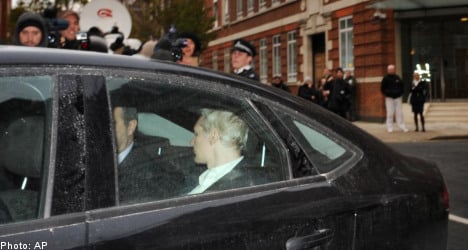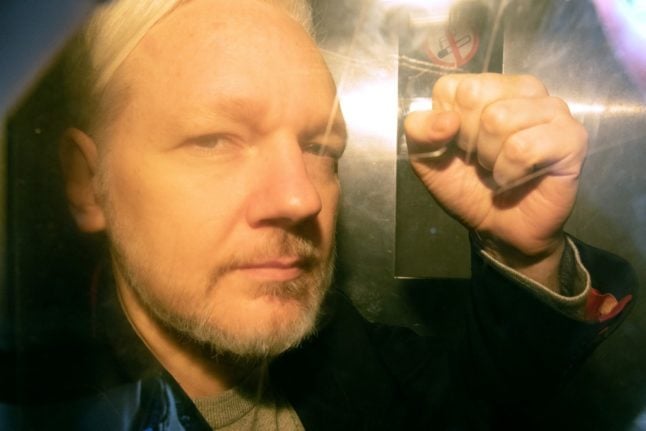The elusive 39-year-old Australian said he would fight an extradition request by Swedish authorities as he appeared in court in London just hours after he emerged from a month in hiding and surrendered to police.
Filmmaker Ken Loach, socialite Jemima Khan, and campaigning journalist John Pilger each offered to put up part of his bail but a judge in London refused, saying a court would review the situation at a hearing on December 14th.
“I am satisfied that there are substantial grounds to believe that if granted bail he would fail to surrender,” district judge Howard Riddle said at City of Westminster magistrates court.
The judge said the Swedish arrest warrant contains “extremely serious allegations” of molestation, unlawful coercion and rape involving two women with whom Assange had sex in Stockholm in August.
Assange had the “means and ability to abscond if he wants to,” Riddle added.
The court heard Assange is accused of unlawfully coercing and sexually molesting a woman on August 14th, and of deliberately molesting her on August 18th.
A fourth allegation claims Assange had sex with a second woman on August 17th while she was asleep at her Stockholm home, and without using a condom.
The WikiLeaks boss, who has denied the charges, appeared calm and collected in court, an AFP reporter said. Wearing a navy blue suit and a white shirt without a tie, he spoke to confirm his name and address in Australia.
Speaking in Stockholm after Assange’s court appearance, the prosecutor in charge of the rape case against the WikiLeaks founder said on Tuesday she had no intention of extraditing him to the United States if he is brought to Sweden to face justice.
“I did not execute a European arrest warrant against him for him to be extradited to the United States,” Marianne Ny told Swedish reporters in the western city of Gothenburg, according to the TT news agency.
“The investigation has nothing to do with WikiLeaks. This concerns him (Assange) personally,” the prosecutor was also quoted as saying by the website of the Aftonbladet daily.
Britain’s Metropolitan Police said earlier in a statement that officers from its extradition unit had arrested Assange on a European arrest warrant “by appointment at a London police station” at 0930 GMT.
WikiLeaks criticised the court ruling as “bizarre” and said it would release more documents later Tuesday from the cache of 250,000 confidential US diplomatic cables that it started to publish on November 28th.
“Let down by the UK justice system’s bizarre decision to refuse bail to Julian Assange. But Cablegate releases continue as planned,” the whistleblowing website said on its Twitter page.
Assange’s Lawyer Mark Stephens told journalists outside court the allegations were “politically motivated”, adding that he expected a “viral campaign” on the Internet on his client’s behalf.
“We have heard the judge say he wishes to see the evidence himself. I think he was impressed by the fact that a number of people were prepared to stand up on behalf of Mr Assange and declare his innocence,” he said.
Loach, Khan — former wife of Pakistan cricket great Imran Khan and one-time girlfriend of film star Hugh Grant — and Pilger each offered £20,000 ($31,400). Another three donors also offered a total of £120,000 between them.
Pilger told the court the case was “a travesty” and “absurd”. After the hearing, he said: “This is a man who has made some very serious enemies for the best reasons.”
WikiLeaks is battling to stay afloat after infuriating Washington with the release of the cables, which have revealed a string of diplomatic embarrassments from all corners of the globe.
In one of the latest leaks, US cables released Tuesday showed that NATO had extended an existing defence plan covering Poland to include Estonia, Latvia and Lithuania after they lobbied for extra protection.
The website has been forced to hop from server to server as various countries tried to close it down and hackers attacked it, though its supporters have responded by setting up hundreds of “mirror” sites to keep it online.
In a sign of Washington’s satisfaction at the arrest, US Defence Secretary Robert Gates, who was visiting Afghanistan on Tuesday, said it “sounds like good news.”
WikiLeaks is also coming under increased financial pressure, with Visa following in the footsteps of MasterCard and PayPal Tuesday by announcing that it was suspending all payments to WikiLeaks.
Swiss authorities shut down one of Assange’s bank accounts on Monday, while a major WikiLeaks donor in Germany is in trouble for not filing its accounts on time.
WikiLeaks has already been expelled from the United States where Attorney General Eric Holder has said authorities were pursuing an “active, ongoing investigation that is criminal in nature” into the leaks.
In an opinion piece for The Australian newspaper after his arrest, Assange said the website was “fearlessly” pursuing facts in the public interest.
Meanwhile, the United States said Tuesday that the arrest of Assange is an issue between Britain and
Sweden, as Washington pursues its own investigation.
“Our investigation is ongoing. As for his arrest, it is, at this point, an issue between Britain and Sweden,” State Department spokesman Philip Crowley told reporters.
“I cannot say that the United States has been drawn into this issue this morning. This is an issue where British authorities have arrested him based on a warrant for his extradition from Sweden,” Crowley said.
“What we’re investigating is a crime under US law. The provision of 250,000 classified documents from someone in the government to someone outside the government is a crime,” Crowley said.
“We’re investigating and we will hold those responsible accountable. That investigation is still ongoing,” he added.



 Please whitelist us to continue reading.
Please whitelist us to continue reading.
Member comments